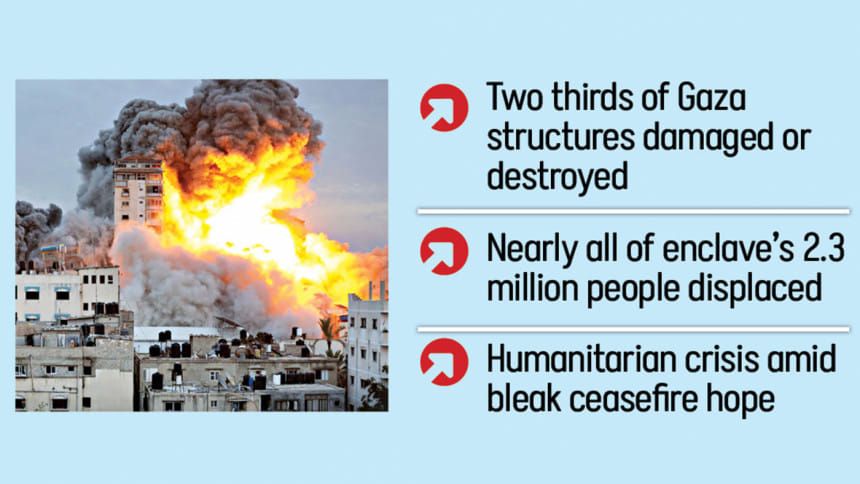Gaza still bleeds

Intensified Israeli airstrikes on Gaza yesterday killed dozens on the eve of the first anniversary of its offensive in the besieged territory that has killed nearly 42,000 Palestinians and left the enclave in ruins.
Israel's war on Gaza has since spread as it invaded Lebanon after months of trading fire across the border, raising the fear of a wider conflict in the Middle East with experts saying it risks sucking in major regional and world powers.
As the Israeli invasion enters its second year, tens of thousands of protesters marched in cities around the world calling for a ceasefire in Gaza and Lebanon, a prospect which experts say is unlikely anytime soon.
The marches were held in almost all major cities across Europe, Africa, Australia and the Americas demanding an end to the conflict.
In Washington, more than a thousand protesters demonstrated outside the White House, seeking that the United States, Israel's top military supplier, stop providing weapons and aid to Israel.
One man attempted to set himself on fire, AFP journalists saw, succeeding in lighting his left arm ablaze before bystanders and police extinguished the flames.
On October 7, 2023, Hamas-led fighters streamed across the border from Gaza into southern Israel, killing about 1,200 people and kidnapping some 250 others, according to Israeli tallies.
The next day, Israel formally declared war on Hamas.
Since then, indiscriminate Israeli bombardment has damaged or destroyed two thirds of the total structures in the Gaza Strip, The United Nations Satellite Centre (UNOSAT) said on September 30. It also damaged or destroyed around 68 percent of cropland and roads.
Only 17 of 36 hospitals remain partially functional, and all suffer from a lack of fuel, medical supplies, and clean water.
According to United Nations Office for the Coordination of Humanitarian Affairs (OCHA), an estimated 1.9 million Palestinians in Gaza (more than 90 percent of the population) have been displaced, with many experiencing multiple forced displacements as a result of persistent Israeli relocation orders.
The blockade on humanitarian goods has caused a hunger crisis in the Palestinian enclave and led to genocide allegations at the World Court that Israel denies.
The offensive has not only destroyed the present day Gaza but also robbed its future as children, who make up almost half of Gaza's entire population, are the primary victims. Of the 42,000 killed in the enclave, at least 16,456 are children.
According to UN, none of them have been able to attend school since October 7. The longer fighting goes on, the greater the chance of losing an entire generation, it said.
The offensive intensified early yesterday with Israeli airstrikes hitting a mosque and a school sheltering displaced people in the Gaza Strip killing at least 26 people and wounding 93 others, the Hamas-run Gaza government media office said.
Palestinian health officials said at least another 20 people had been killed since Saturday night in northern Gaza, after the army sent tanks into areas there for the first time in months and urged residents to leave.
The Israeli military said it had conducted "precise strikes on Hamas terrorists" who were operating within command and control centres embedded in Ibn Rushd School and the Shuhada al-Aqsa Mosque, in the area of Deir al-Balah in central Gaza.
Hamas rejects accusations it uses civilian facilities such as schools, hospitals and mosques for military purposes.
Amid the violence, the International Committee of the Red Cross urged all parties to ensure all civilians were protected.
"This is a year marked by heartbreak and unanswered questions. Families have been torn apart, with many loved ones still held against their will. Tens of thousands of people have been killed and millions have been displaced across the region," it said.
The Hamas-run Gaza government media office said Israel had struck 27 houses, schools and displacement shelters across Gaza in the past 48 hours.
Medics said an Israeli airstrike killed three Palestinians in Rafah, near the border with Egypt, where Israeli forces have been operating since May.
On Saturday, Israeli army issued new evacuation orders in parts of Nuseirat camp in the central Gaza Strip, just north of Deir al-Balah, forcing hundreds of families to leave their houses. The military statement said its forces aimed to operate against Hamas fighters who waged attacks from the territory.
Meanwhile, Israeli tanks pushed into the northern Gaza areas of Beit Lahiya and Jabalia overnight, and planes hit several houses, killing at least 20 people, according to medics.
The Israeli military said its forces had encircled the area of Jabalia.
In one air strike, 10 people were killed in one house, and five others in another strike on a second home. Residents described it as one of the worst nights in many months.
"The war is back," said Raed, 52, from Jabalia, before he and his family left for Gaza City yesterday.
"Dozens of explosions from airstrikes and tank shelling shook the ground and buildings, it felt like the early days of the war," he told Reuters via a chat app.
The armed wings of Hamas, the Islamic Jihad, and smaller factions said fighters were engaged in gunbattles with Israeli forces in Jabalia, the largest of Gaza Strip's eight refugee camps.
Palestinian and UN officials say no place in the enclave is safe, including the humanitarian zones.
Ahead of the anniversary, Israel placed its forces on alert.
Military spokesman Rear Admiral Daniel Hagari said at a televised briefing: "We are prepared with increased forces in anticipation for this day", when there could be "attacks on the home front".
In Washington, US Vice President and Democratic presidential candidate Kamala Harris said US will continue to pressure Israel and other players in the Middle East to reach a ceasefire deal in Gaza even as advocates say that the United States has not thus far used its leverage over its ally.
Washington's occasional condemnation of Israel over the civilian death toll has mostly been verbal with no substantive change in policy.
President Joe Biden laid out a three-phase ceasefire plan for Gaza on May 31 but a deal between Israel and Hamas has not been reached due to gaps in exchanges of Israeli hostages and Palestinian prisoners, and Israel's demand that it maintain presence in a corridor on the southern edge of the Gaza Strip bordering Egypt.
As the war in Gaza enters its second year and a wider Middle East conflict is on the verge of breaking out, one question remains: How, if it at all, does this end?
"I'm not sure that it does end," Mairav Zonszein, senior Israel-Palestine analyst for International Crisis Group, told the ABC.
"At this point, we can't talk just about the war in Gaza, but we have to talk about the war with Hezbollah, and the war in the West Bank … and of course Iran and its proxies."
All of this makes the prospect of a ceasefire in Gaza even less likely, according to Zonszein.
"There's a spectrum," she said.
"It could get much, much worse on several fronts. They're all connected and the connecting theme … is Gaza."

 For all latest news, follow The Daily Star's Google News channel.
For all latest news, follow The Daily Star's Google News channel. 





Comments